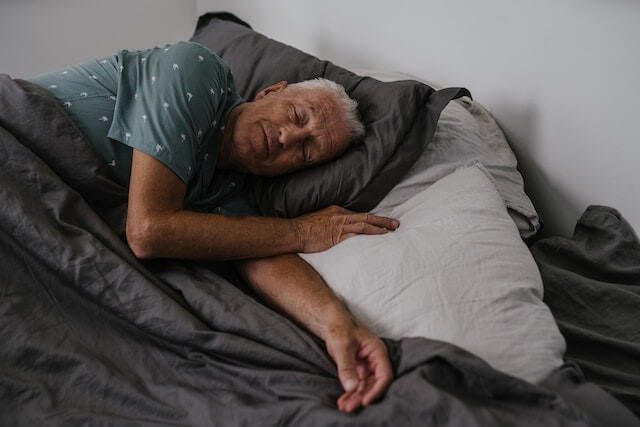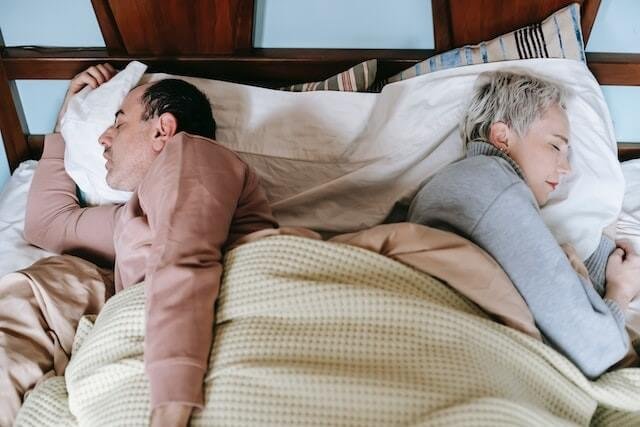An older family member sleeping too light or too much is a common occurrence. Sometimes they sleep at the wrong hours and spend nights tossing and turning.
Insomnia is a sleep disorder in which people have trouble falling or staying asleep. But insomnia is more common as people get older, and this affects their general health and quality of life.
In this blog, we tackle the issue of sleep disorders in old age, helping you get better acquainted with the causes, signs, and treatments. This can help your older friends and family members improve the quality of sleep and avoid elderly insomnia.
Insomnia: An Overview

Image Credit: Unsplash
Insomnia is a common problem in older adults, but it can start at any age. According to research, up to 40% of older persons have some sort of sleep disruption, and the prevalence of insomnia rises with age.
There are many reasons why insomnia is more common in older adults:
- Changes in sleep patterns
- Health problems
- The use of medications that make it hard to sleep.
–> SEE ALSO: Herbal Solutions For Insomnia
There is also another prevalent fact that, as people age, they are more prone to go through physical and psychological changes including pain, worry, and despair that can affect their ability to sleep. But there are other prominent causes for Older Adult Sleep Disorders.
Older Adult Sleep Disorder Causes

Image Credit: Pexels
It can be very distressing to find that an older adult has difficulty falling or staying asleep. It is also a particularly helpless situation because most of them do not know how to voice out their concerns in the right words.
However, there are a number of common causes for elderly insomnia and other older adult sleep disorders:
- Physical changes: Our bodies experience physical changes as we age, which may have an impact on our sleep habits. For instance, age-related medical conditions can also affect the quality of sleep, as can the production of hormones that promote sleep.
- Health issues: A number of ailments like depression, arthritis, and heart disease are more prevalent in older adults like. This can be painful, difficulty to sleep can cause insomnia.
- Lifestyle factors: Insomnia in older adults can be brought on by poor sleep habits, including inconsistent bedtimes, excessive caffeine consumption, and screen time before bed.
Other than these factors, older adults can face sleep problems due to certain living conditions. It can sound a bit far-fetched but there are studies and evidences on these.
1. Insomnia and Retirement

Image Credit: Pexels
Retirement can be particularly hard on older adults and retirement anxiety is as real as can be. From a busy work-life, they are suddenly expected to bring about significant life changes. Anxiety levels are also at an all-time high during old age. Retired older adults have more time to worry about their health and finances, which can increase anxiety and stress levels, interfering with sleep.
“As insomnia can begin at any point during the ageing process and is not always associated with retirement, there is not a clear cause-and-effect relationship.”
Despite this, retirement can result in a variety of stressors and lifestyle and routine changes:
- Adjustments to sleep patterns
- An increase in time spent at home
- A decrease in social interaction.
These modifications in daily life have a huge role to play in interfering with sleep and result in the emergence of insomnia.
In short: Even though retirement may not be a direct cause of insomnia in older adults, it can make current sleep issues worse or cause the emergence of new ones. In order to develop a treatment plan, older adults should discuss any sleep problems that develop during retirement with a healthcare professional.
–> SEE ALSO: Tired And Lethargic? It Could Be a Lack of Sleep. Here’s How to Fix It
2. Lone Senior and Sleeping Problem

Image Credit: Pexels
This is not a general trend, but compared to their married counterparts, most single seniors are more likely to have sleep issues.
However, you can notice the following issues that may arise from not/being a lone senior:
- Seniors who are single are more likely to live alone and to be socially isolated, which can add to feelings of loneliness and stress. These emotions might interfere with sleep and help other sleep disorders like insomnia develop.
- Married seniors might have issues with their partner’s sleeping patterns, such as snoring or restless movements. In this case, the quality of sleep for both partners is affected by modifications in sleeping habits or medical conditions.
- Ultimately, no matter your relationship status, it’s important to remember that sleep issues can affect anyone. If your quality of life is being negatively impacted by your sleep issues, it’s a sign that you need to seek medical attention.
In short: A variety of factors, including physical and psychological factors, medical conditions, and lifestyle choices, can contribute to sleep disturbances in older adults. These factors include relationship status, but not the presence of sleep problems is not solely dependent on relationship status.
3. Problem with Sleeping in Cities

Image Credit: Pixabay
It can come as a surprise, but urban life can have a huge impact on your sleep!
- The frantic pace of city life and the constant stimulation from noise and other environmental factors can make it challenging for older adults to fall asleep and stay asleep.
- We also need to remember that cities are constantly lit – streetlights, neon signboards, apartment lighting – all of these are constant sensory stimulation.
- Even the consistent noise of traffic and vehicles can contribute to sleeplessness, especially for the elderly who have recently moved from a rural place to the city.
These demands of city life, city dwellers may also feel more stress and anxiety, which can affect sleep.
In short: Continued city life over a period of time can reduce the quality of sleep. As people age, it becomes more difficult to fall asleep and stay asleep with the light, noise, pollution and traffic of urban spaces.
–> SEE ALSO: Understand Your Body’s Sleep Language And Its Problems
Age-Related Insomnia Symptoms

Image Credit: Pixabay
Insomnia in older people frequently shows up as difficulty falling asleep and staying asleep all through the night. But it is not that simple. This varies in different people:
- Frequent awakenings – Some older people with insomnia may wake up several times through the course of the night and have difficulty falling back asleep.
- Daytime fatigue – Older adults who have insomnia may experience this peculiar condition, here they have low energy levels throughout the day, affecting their capacity to carry out daily tasks.
Not being able to sleep, especially in your old age can have a lot of concerning consequences. If an elderly person does not get their 7-8 hours of uninterrupted sleep, they may experience the following issues:
- Reduced Cognitive Function: Not getting enough sleep can have an impact on memory and concentration, making it more challenging to carry out daily tasks and remember crucial information.
- Accidents: During old age, people are more prone to simple accidents that can be even fatal. Fatigue and sleepiness can increase the risk of accidents and falls, which can result in hospitalisation or bedridden conditions.
- Immune System Weakness: Sleep is like the lubricant that keeps the immune system strong. So naturally, a lack of sleep leaves the immune system weak, making it more difficult for the body to fend off illness and disease.
- Chronic Health Issues: Chronic sleep deprivation has been connected to a number of chronic health issues, such as diabetes, depression, and cardiovascular disease.
- Mood Shifts: Sleep is crucial for controlling our emotions and mood, and it’s possible to feel agitated, anxious, or depressed when you don’t get enough of it.
- Reduced Physical Function: Sleep deprivation can impair one’s physical capabilities and energy levels, making it more difficult to engage in physical activity and finish daily chores.
- Reduced Quality of Life: In general, sleep deprivation can have a significant negative impact on quality of life, making it more difficult to take pleasure in life and uphold relationships with friends and family.
During the latter part of their life, it’s of great importance that the elderly receives as much comfort and happiness as they can. Sleeplessness can rob them off this simple life, hence it’s critical for to take action to ensure they are getting enough good sleep.
Older Adult Sleep Disorder Treatment

Image Credit: Pexels
Sleep disorder treatment for older adults focuses on a number of methods to bring order in life and simplify routine so that the body does not take too much stress.
- Creating a sleep schedule: Seniors who follow a regular sleep schedule can fall asleep with greater ease. This entails keeping a consistent bedtime and wakeup time (even on weekends!).
- Avoiding Certain Components: Avoiding caffeine, nicotine, and alcohol is advisable, especially in the evenings because they can interfere with sleep. Are you an older adult who smokes? It might be time to wean off slowly.
- Exercise: Regular physical activity can enhance sleep efficiency and heighten drowsiness levels before bed. Nothing tires out the body better than 30-40 minutes of exercise on a daily level.
- Techniques for Relaxation: Deep breathing, meditation, and yoga are just a few of the techniques that can help seniors relax and unwind. Teaching them how to manage these can be extremely beneficial for their sleep hygiene.
- Creating a sleep-friendly environment: Seniors’ sleep environment can affect their ability to get to sleep and stay asleep. Reducing temperature, light, and noise in the bedroom is part of this.
- Weight reduction: Issues like obesity or overweight can cause digestive problems or simply make it more difficult to fall asleep. Reducing weight by exercising or reducing food intake can make digestion smoother, giving you better nights.
- Bright light therapy: This is used for older adults who go to bed and wake up early. They are exposed to timed bright lights in the evening which helps them stay awake a bit longer and fall asleep at a later time.
If none of the aforementioned remedies work, seniors should seek medical attention. This may entail obtaining a prescription for sleep medications or visiting a doctor for a sleep study. Seeing a therapist or a counsellor to look at underlying anxiety and depression is also a good action plan.
Herbal remedies for Insomnia in Older People

Image Credit: Unsplash
Ayurveda is rich in therapies for sleep disorders and sleeplessness. Herbal remedies for sleeplessness can also be a lot more easier on the body than heavy sleeping pills and other allopathic medications.
Several herbal remedies can assist elderly people with sleep issues:
- Valerian root: For centuries, people have turned to natural sleep aids like valerian root. It is thought to function by raising GABA levels, a neurotransmitter involved in sleep regulation.
- Chamomile: Chamomile has been used as a natural sedative to encourage relaxation and enhance sleep. A cup of chamomile tea can help to relax the mind and encourage sleep.
- Lavender: Lavender has been used to treat insomnia and enhance the quality of sleep because of its calming and calming effects. A lavender-scented spray or a few drops of lavender essential oil applied to your pillow can aid in promoting relaxation and better sleep.
- Passionflower: Studies on this herb have shown that it has a sedative effect, making it a good option for treating insomnia. Prior to bed, taking passionflower supplements or drinking passionflower tea can help you sleep better.
- Ashwagandha: Ashwagandha has a considerable relaxing effect on symptoms of anxiety. The roots of this herb lowers levels of the stress hormone cortisol, reducing overall stress in our body. This can alleviate majority of sleep disorder symptoms like sleep apnea, insomnia etc.
- Brahmi: Similar to Ashwagandha, Brahmi also has calming adaptogenic properties helping you deal with stress and anxiety.
- Shankhapushpi: This significantly reduces cortisol levels, helping manage stress and insomnia by relaxing the mind.
- Tagara: Studies show that Tagara helps you fall asleep faster and reduces sleep disturbance significantly, thereby keeping you asleep longer.
- Jatamansi: Studies show that Jatamansi acts as a potent depressant on the central nervous system, relieving insomnia and other mental conditions.
- Jatiphala: This is also known as Nutmeg. It is a brain booster, enhances concentration, relieves stress and induces sleep.
“The hormone melatonin, which the body naturally produces, is involved in controlling the sleep-wake cycle. Some people, especially those with jet lag or shift work sleep disorders, may benefit from taking melatonin supplements to improve their sleep.”
GudSlep for Herbal Sleep

Image Credit: Pexels
GudSlep™ is an ayurvedic proprietary medicine enriched with the goodness of herbs that have been clinically proven to be effective against sleep diseases.
GudSlep contains an innovative blend of herbs like Ashwagandha, Brahmi, Shankapushpi, Tagara, Jatamansi and Jatiphala which have been clinically proven to aid in improving sleep quality. Hygienically prepared in our labs, GudSlep is also non-habit forming, making it an attractive sleep solution for older people.
–> SEE ALSO: Why Should Ashwagandha Be a Part of Your Lifestyle?
Being overweight can also stand in your way to getting quality, uninterrupted sleep, for which Lo-Wt by Sava Herbals is the best solution. With minimal side-effects, Lo-Wt(TM) is an herbal weight reduction supplement enriched with Green Coffee Bean and a unique blend of Vrikshamla, Arjuna, Pippali, Sunthi, Musta and Guggul which aid weight reduction improves your lipid profile.
Conclusion

Image Credit: Pixabay
Insomnia in older adults can be a frustrating and difficult problem. It can also be very overwhelming and confusing at an older age. However, this is not the end and it is manageable with the right approaches.
Our closest and dearest seniors can get the restful sleep they need and lead happier, healthier lives by following the discussed suggestions.
FAQs: Managing Insomnia in Old Age

Image Credit: Pixabay
1. Insomnia: What is it?
Insomnia is a common sleep disorder that is marked by the difficulty of falling or staying asleep.
2. How prevalent is insomnia in older people?
According to studies, sleep quality deteriorates with age, with up to 40% of older adults reporting some type of disturbance.
Source: Click Here
3. What are the reasons of sleeplessness in elderly age?
Insomnia in older adults can be influenced by physical changes, medical conditions, lifestyle choices, retirement, and urban living.
4. Does insomnia follow retirement?
Retirement may not always be the primary factor in older adults’ sleep issues, but it can exacerbate current issues or contribute to the emergence of new ones.
Source: Click Here
5. Does the presence of a partner impact sleep in older adults?
No matter their marital status, anyone can develop sleep issues, but single seniors may be more prone to suffer from stress and feelings of loneliness. A partner’s sleep problems can also negatively impact health and well-being.
Source: Click Here
6. What impact does city life have on older people’s sleep?
For older adults who live in cities, the hectic pace of daily life and constant stimulation can make it hard for them to fall and stay asleep, as well as increase stress and anxiety.
Source: Click Here
7. What signs of insomnia do seniors show?
Older adults who suffer from insomnia frequently experience difficulty falling asleep, trouble staying asleep, frequent awakenings, and daytime fatigue.
8. What effects does poor sleep have in later life?
Reduced cognitive function, an elevated risk of accidents, a compromised immune system, chronic medical conditions, mood swings, reduced physical function, and a lower quality of life can all be results of sleep deprivation.
9. How can insomnia be treated in older people?
A healthcare professional can assist older adults in improving the quality of their sleep by creating a treatment plan that may include dietary adjustments and therapy. Medications like trazodone, antidepressants or herbal options containing Ashwagandha and Shankhapushpi are given.
Source: Click Here
10. What are the typical sleep issues that older people in cities experience?
The frantic pace of city life and constant stimulation from noise, light, and other environmental factors may make it difficult for older adults to fall asleep and stay asleep. Additionally, the demands of city life can cause stress and anxiety, which can affect sleep.
Source: Click Here
11. How can older people who live in cities improve the quality of their sleep?
Urban older adults who create a sleep-friendly environment, practise good sleep hygiene, and, if necessary, get medical assistance can all improve their quality of sleep. For example, you could use curtains or an eye mask to block out light, use earplugs or a white noise machine to drown out noise, or practise relaxation techniques like meditation or deep breathing.
12. What part do stress and anxiety play in the lack of sleep that older people in cities experience?
For older adults who live in cities, stress and anxiety can be major contributors to sleep issues. The fast-paced and demanding nature of city life can cause stress and anxiety feelings, which can affect the quality of sleep and make it difficult to fall and stay asleep.
Source: Click Here
13. How can older people living in cities better control their stress and anxiety to get more rest?
By using stress-reduction techniques like exercise, mindfulness, and relaxation, older adults who live in cities can manage their stress and anxiety to get better sleep. To manage their stress and anxiety, they might also profit from therapy or counselling.
Source: Click Here
14. Can older people who live in cities find specific products or treatments that will improve their quality of sleep?
White noise machines, earplugs, and eye masks to block out light and noise are some of the products and therapies that can help older adults in urban areas sleep better. Also helpful for treating insomnia are prescription or over-the-counter sleep aids and cognitive behavioural therapy (CBT-I). To choose the best course of treatment for each patient’s requirements, it’s crucial to get advice from a healthcare professional.









Superb blog! Do you have any suggestions for aspiring
writers? I’m hoping to start my own website soon but I’m a little lost on everything.
Would you suggest starting with a free platform llike WordPress or go for a paid option? There are so many choices out there that I’m
completely overwhelmed .. Any recommendations?
Bless you! https://Ukrain-Forum.Biz.ua/